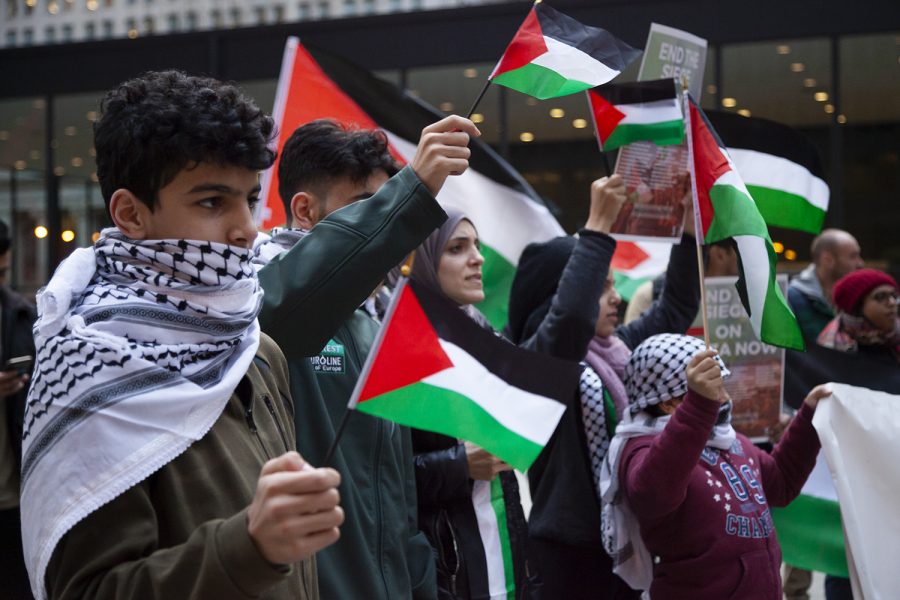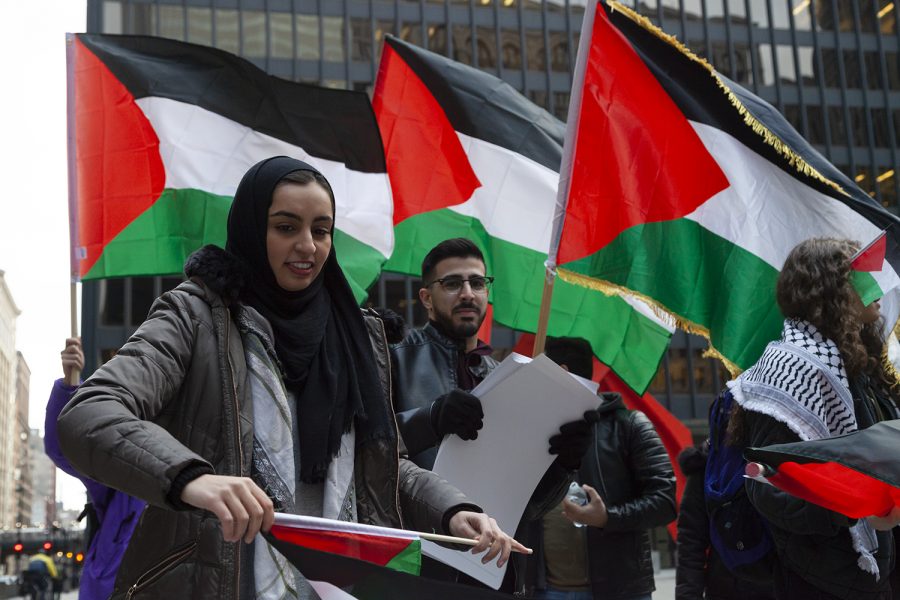Students for Justice in Palestine stage ‘die-in’ to protest civilian deaths in Gaza
People of all ages come to Federal Plaza to protest recent bombings of Gaza Wednesday, Nov. 20.
November 25, 2019
“Rasmi al-Swarka, Yousra al-Swarka, Mariam al-Swarka, Mohammad al-Swarka.”
These were only a handful of the names Students for Justice in Palestine member Mahmoud Awadallah shouted as he identified those killed by missiles in Gaza on Nov. 14. Nearby, demonstrators laid on the ground beneath him holding posters, flags and tombstones representing those found dead in the Palestinian territory.
“The people of Gaza live under constant threat of attack,” said Awadallah, a sophomore at DePaul University. “The [34] Palestinians that were killed last week were not just names. They were not just numbers. They were people … They had dreams that will never be fulfilled.”
Dozens of Palestinian students, organizers and allies from across Illinois attended a die-in at Federal Plaza, 219 S. Dearborn St., Wednesday, Nov. 20 to protest the Israeli military’s attack on Palestinian civilians in Gaza.
A die-in is a popular method of protest where participants mimic the dead to make a statement about issues such as gun control, war and climate change that threaten lives.
Following two days of intense fighting between Israel and the militant group Islamic Jihad, based in Gaza, a brief cease-fire was broken when Islamic Jihad fired at least five rockets at southern Israel, according to a Nov. 14 Associated Press article.
On Tuesday, Nov. 14, Israel launched an airstrike in retaliation, killing 18 militant Palestinians and 16 civilians, eight of whom were children, according to the Associated Press.
The Israeli military claimed to precisely target militant households and argued that civilian deaths in such a densely-packed environment are inevitable, according to a Wednesday, Nov. 15 New York Times article.
At the rally, students emphasized Israel’s longstanding history of civilian casualties in warfare, citing incidents in 2008 and 2014 wherein more than 700 and 1,400 Palestinians civilians were killed, respectively.
“It’s important to realize that not only is it an attack, it’s an ongoing crisis,” said Ayah Ali, a senior and president of Students for Justice in Palestine at Benedictine University.
Palestinian militants also have come under international criticism for firing rockets indiscriminately at Israeli civilian areas, according to the Associated Press.
Shaima Darayyad, a senior at the University of Illinois Chicago, said the demonstration was an important way to educate people about the occupation of Gaza and injustice happening in Palestine.
At the die-in, which was organized with other SJP groups as part of a larger national movement, students handed out flyers detailing Gazan civilians’ restricted access to water, finances and mental health issues.
“A lot of things are happening in Palestine right now, and a lot of them aren’t being represented on the news or anywhere on social media,” Awadallah said. “Us, personally, as students, since we have a really good platform here in Chicago, we have to make sure that we do our duty, … any small thing that we can do to spread the word on what’s happening in Palestine right now.”
Ali, who is also the steering committee chair for Students for Justice in Palestine Chicago and helped organize the die-in, said the group is encouraging people to call their elected representatives so the crisis in Gaza can be addressed.
“We just want to keep pushing,” Ali said. “We are constantly being silenced, and I never want that to be a reason why we give up or lose hope. I truly do think one day there will be a free Palestine, and that’s why we’re here today and that’s why we’re going to keep working hard.”
Nour Abughoush, a 23-year-old Orland Park resident with the civic engagement group American Muslims for Palestine, said activism and protests are important and integral to her identity.
“It’s part of my life, it’s part of my blood,” Abughoush said. “No matter how old you get, Palestine will always be part of you.”









